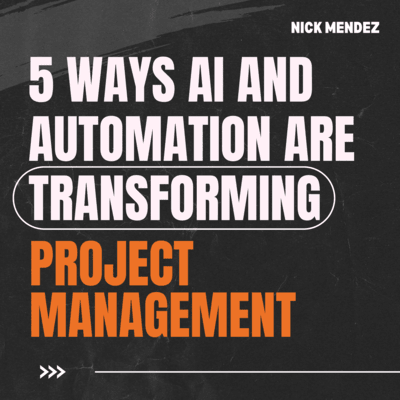
In today’s rapidly evolving business landscape, the increasing use of artificial intelligence (AI) and automation is reshaping traditional project management practices across many industries. Recognizing the significance of these technological advancements is crucial for professionals navigating the dynamic field of project management.
We will examine five key ways that artificial intelligence and automation are transforming project management to highlight their significance and the revolutionary effects they are having.
1) Streamlined Task Allocation and Resource Management
Integrating AI-driven tools has led to significant advancements in task allocation and resource management in modern project management. These tools leverage AI algorithms to automate task assignments, considering team members’ specific skills and availability. By intelligently matching tasks with individuals possessing the requisite expertise and considering their current workload, project managers can ensure optimal resource utilization and minimize potential bottlenecks or delays.
Predictive analytics are pivotal in enhancing resource management by forecasting demand and optimizing resource allocation. By analyzing historical project data and identifying trends, these tools enable project managers to make informed decisions about resource allocation, thereby avoiding shortages or overallocation. Automated task assignment in software development projects speeds up the coding process; predictive analytics in construction projects avoid delays by foreseeing material and equipment requirements.
2) Enhanced Decision-Making with Data Analytics
In modern project management, having data analytics empowered by AI is pivotal for making informed decisions. AI enables the analysis of extensive datasets, providing project managers with valuable insights to drive strategic actions. Through AI-driven data analytics, project managers can gain immediate updates on project progress, allowing for real-time monitoring of performance metrics and early detection of potential issues. This proactive approach enables teams to address challenges promptly, minimizing disruptions and ensuring project objectives are met efficiently.
AI also makes predictive analytics easier, which helps project managers foresee risks and create proactive mitigation plans. By analyzing historical project data and identifying patterns, AI algorithms forecast potential risks and their likelihood of occurrence. With this foresight, project managers can devise contingency plans and allocate resources effectively to mitigate risks and maintain project momentum. In essence, embracing data-driven decision-making in project management enhances accuracy, reduces uncertainty, fosters strategic planning, and improves project outcomes.
3) Improved Communication and Collaboration
The infusion of artificial intelligence into project management has catalyzed a transformative shift in communication and collaboration methodologies, amplifying productivity and fortifying teamwork. AI-driven chatbots seamlessly integrate into team communication channels, furnishing real-time updates and fostering smoother interactions. Beyond mere dissemination of information, these chatbots furnish valuable insights, enriching the decision-making process and ensuring teams remain well-informed throughout project lifecycles.
AI-enabled automation optimizes communication by issuing automatic reminders for deadlines and pivotal milestones. This proactive approach safeguards against oversight and project delays by keeping team members abreast of impending tasks. Simultaneously, AI-powered collaboration tools scrutinize communication patterns, extracting actionable insights to refine teamwork dynamics over time. Through learning from past interactions, these tools cultivate an environment of continuous improvement, augmenting collaboration efficacy and bolstering project success.
4) Predictive Project Planning and Forecasting
The introduction of AI-infused project planning software marks a paradigm shift in project management methodologies, offering a potent arsenal of predictive capabilities to anticipate project outcomes and optimize resource utilization. Leveraging AI algorithms, these tools analyze vast datasets to forecast project timelines and resource requirements with unprecedented accuracy. By extrapolating historical data and identifying patterns, project managers can make informed predictions about project completion dates and the necessary resources, enabling proactive planning and resource allocation.
Predictive analytics powered by AI also enables project managers to anticipate obstacles and bottlenecks before they arise. By proactively assessing project risks and vulnerabilities, teams can develop mitigation strategies and contingency plans to address potential issues, minimizing disruptions and ensuring smoother project execution. Embracing predictive planning enhances project management efficiency, mitigates risks, and reduces delays, safeguarding project success in an ever-evolving business landscape.
5) Agile Adaptation and Continuous Improvement
Integrating agile methodologies with artificial intelligence heralds a transformative approach to project management characterized by adaptability and continuous refinement. Bolstered by AI-driven insights, Agile principles equip project teams to swiftly respond to evolving circumstances by dynamically adjusting plans based on real-time data and feedback. This symbiotic relationship enables teams to remain agile in their approach, effectively navigating uncertainties and optimizing project outcomes through iterative cycles of learning and adaptation.
Project managers can make timely decisions and proactive course corrections using artificial intelligence (AI) to analyze incoming data and feedback and identify emerging trends and potential issues. This iterative process fosters a culture of continuous improvement, where project teams harness AI-powered insights to refine processes and enhance performance over time. Embracing AI-supported agile methodologies empowers teams to stay responsive and resilient, driving success through continuous learning and refinement.
Conclusion
In conclusion, integrating artificial intelligence (AI) and automation has ushered in a new era of efficiency and productivity in project management, marked by five transformative shifts. AI and automation have revolutionized traditional practices from streamlined task allocation and resource management to enhanced decision-making with data analytics, improved communication and collaboration, predictive project planning and forecasting, and agile adaptation and continuous improvement.
Embracing this digital evolution is paramount for project managers, as it ensures enhanced efficiency and productivity and opens doors to prospects and potential advancements in AI-powered project management. Therefore, a call to action is imperative for project managers to seize the opportunity and leverage AI and automation to achieve better project outcomes, ultimately driving success in the ever-evolving landscape of project management.
Further Reading
- https://tech.ed.gov/files/2023/05/ai-future-of-teaching-and-learning-report.pdf
- https://projectplanner.ai/applying-ai-to-streamline-project-resource-allocation/
- https://www.techtarget.com/searchenterpriseai/feature/How-AI-is-transforming-project-management
- https://www.pecan.ai/blog/generative-ai-predictive-analytics/
Leave A Comment